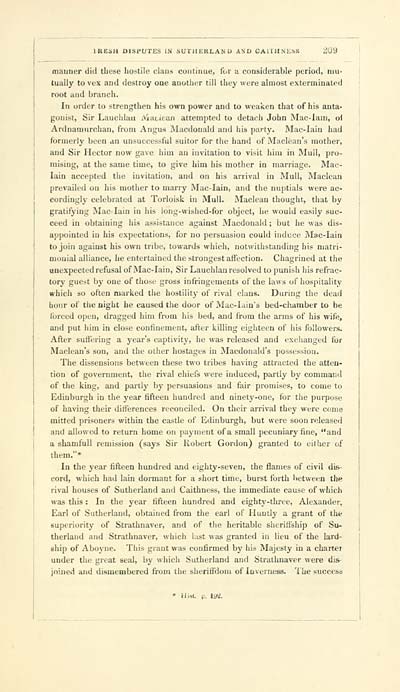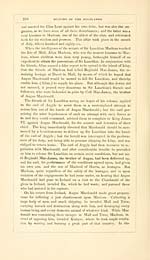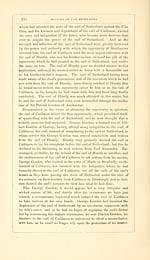Download files
Complete book:
Individual page:
Thumbnail gallery: Grid view | List view

IRESH DISPUTES IN SUTHERLAND AND CAITHNESS 209
manlier did tliese hostile clans continue, for a considerable period, tnu-
lually to vex and destroy one another till tliey were almost exterminated
root and branch.
In order to strengthen his own power and to weaken that of his anta-
gonist, Sir Lauchlau Aiatitan attempteil to detach John Mac-Iaiti, oi
Ardnamurchan, from Angus Jlacdonald and his parly. Mac-Iain had
formerly been an unsuccessful suitor for the iiand of Maclean's mother,
and Sir Hector now gave him an invitation to visit him in Muil, pro-
mising, at the same time, to give him his mother in marriage. Mao-
Iain accepted the invitation, and on his arrival in Mull, Maclean
prevailed on his mother to marry Mac- Iain, and the nuptials were ac-
cordingly celebrated at Torloisk in Mull. Maclean thought, that by
gratifying Mac- Iain in his long-wished-for object, he would easily suc-
ceed in obtaining his assistance against Macdonald ; but he was dis-
appointed in his expectations, for no persuasion could induce Mac-Iain
to join against his own tribe, towards which, notwithstanding his matri-
monial alliance, he entertained the strongest aft'ection. Chagrined at the
unexpected refusal of Mac-Iain, Sir Lauchlan resolved to punish his refrac-
tory guest by one of those gross infringements of the laws of hospitality
which so often marked the hostility of rival clans. During the dead
hour of the night he caused the door of Mac-Iain's bed-chamber to be
forced open, dragged him from iiis bed, and from tlie arras of his wife,
and put him in close confinement, after killing eighteen of his followers.
After suffering a year's captivity, he was released and exchanged for
Maclean's son, and the other hostages in Macdonald's possession.
The dissensions between these two tribes having attracted the atten-
tion of government, the rival chiefs were induced, partly by command
of the king, and partly by persuasions and fair promises, to come to
Edinburgh in the year fifteen hundred and ninety-one, for the purpose
of having their differences reconciled. On their arrival they were come
mitted prisoners within the castle of Edinburgh, but were soon released
and allowed to return home on payment of a small pecuniary fine, "and
a shamlull remission (says Sir Robert Gordon) granted to either of
them."*
In the year fifteen hundred and eighty-seven, the flames of civil dis-
cord, which had lain dormant for a short time, burst forth lietween the
rival houses of Sutherland and Caithness, the immediate cause of which
was this : In the year fifteen hundred and eighty-three, Alexander,
Earl of Sutherland, obtained from the earl of Huntly a grant of the
superiority of Strathnaver, and of the heritable sherifiship of Su-
therland and Strathnaver, which Uist was granted in lieu of the lard-
ship of Aboj'iie. This grant w;is confirmed by his Majesty in a charter
under the great seal, by which Sutherland and Strathnaver were dis-
joined and dismembered from the sheriffdom of Inverness, 'the success
manlier did tliese hostile clans continue, for a considerable period, tnu-
lually to vex and destroy one another till tliey were almost exterminated
root and branch.
In order to strengthen his own power and to weaken that of his anta-
gonist, Sir Lauchlau Aiatitan attempteil to detach John Mac-Iaiti, oi
Ardnamurchan, from Angus Jlacdonald and his parly. Mac-Iain had
formerly been an unsuccessful suitor for the iiand of Maclean's mother,
and Sir Hector now gave him an invitation to visit him in Muil, pro-
mising, at the same time, to give him his mother in marriage. Mao-
Iain accepted the invitation, and on his arrival in Mull, Maclean
prevailed on his mother to marry Mac- Iain, and the nuptials were ac-
cordingly celebrated at Torloisk in Mull. Maclean thought, that by
gratifying Mac- Iain in his long-wished-for object, he would easily suc-
ceed in obtaining his assistance against Macdonald ; but he was dis-
appointed in his expectations, for no persuasion could induce Mac-Iain
to join against his own tribe, towards which, notwithstanding his matri-
monial alliance, he entertained the strongest aft'ection. Chagrined at the
unexpected refusal of Mac-Iain, Sir Lauchlan resolved to punish his refrac-
tory guest by one of those gross infringements of the laws of hospitality
which so often marked the hostility of rival clans. During the dead
hour of the night he caused the door of Mac-Iain's bed-chamber to be
forced open, dragged him from iiis bed, and from tlie arras of his wife,
and put him in close confinement, after killing eighteen of his followers.
After suffering a year's captivity, he was released and exchanged for
Maclean's son, and the other hostages in Macdonald's possession.
The dissensions between these two tribes having attracted the atten-
tion of government, the rival chiefs were induced, partly by command
of the king, and partly by persuasions and fair promises, to come to
Edinburgh in the year fifteen hundred and ninety-one, for the purpose
of having their differences reconciled. On their arrival they were come
mitted prisoners within the castle of Edinburgh, but were soon released
and allowed to return home on payment of a small pecuniary fine, "and
a shamlull remission (says Sir Robert Gordon) granted to either of
them."*
In the year fifteen hundred and eighty-seven, the flames of civil dis-
cord, which had lain dormant for a short time, burst forth lietween the
rival houses of Sutherland and Caithness, the immediate cause of which
was this : In the year fifteen hundred and eighty-three, Alexander,
Earl of Sutherland, obtained from the earl of Huntly a grant of the
superiority of Strathnaver, and of the heritable sherifiship of Su-
therland and Strathnaver, which Uist was granted in lieu of the lard-
ship of Aboj'iie. This grant w;is confirmed by his Majesty in a charter
under the great seal, by which Sutherland and Strathnaver were dis-
joined and dismembered from the sheriffdom of Inverness, 'the success
Set display mode to: Large image | Transcription
Images and transcriptions on this page, including medium image downloads, may be used under the Creative Commons Attribution 4.0 International Licence unless otherwise stated. ![]()
| Early Gaelic Book Collections > Ossian Collection > History of the Highlands and of the Highland clans > Volume 1 > (315) |
|---|
| Permanent URL | https://digital.nls.uk/79676377 |
|---|
| Description | Vol. I. |
|---|---|
| Shelfmark | Oss.247 |
| Additional NLS resources: | |
| Attribution and copyright: |
|
| Description | Selected books from the Ossian Collection of 327 volumes, originally assembled by J. Norman Methven of Perth. Different editions and translations of James MacPherson's epic poem 'Ossian', some with a map of the 'Kingdom of Connor'. Also secondary material relating to Ossianic poetry and the Ossian controversy. |
|---|
| Description | Selected items from five 'Special and Named Printed Collections'. Includes books in Gaelic and other Celtic languages, works about the Gaels, their languages, literature, culture and history. |
|---|

